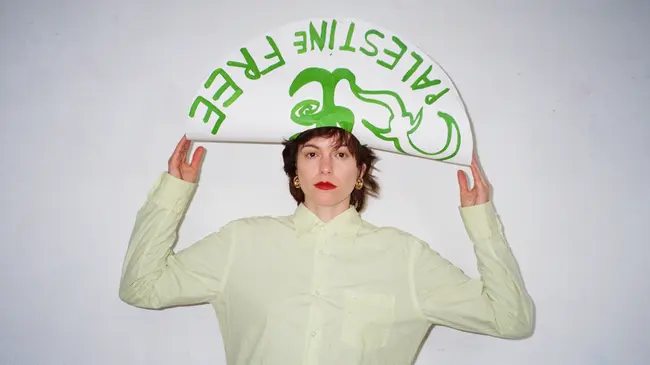I think it’s extremely important for marginalised folks to own their own stories

Ethereal; shimmering like intense golden heat. Lyra Pramuk blends together classical singing with contemporary club culture and performance art. Now based in Berlin, Lyra is part of the Holly Herndon ensemble and has collaborated on Colin Self’s MoMA debut. Pressing pause on her busy schedule, we discussed technological landscapes, poetry, and everything in between.
Let’s start at the beginning. How did you get here?
Music has always been a big part of my life. My grandmother was a church pianist and choir director, so my siblings and I began singing at age five. When I was sixteen I decided I wanted to pursue music professionally, focusing on vocal performance. I practised daily for several hours, learning to sing in several languages. At this point, my focus became really diverse, from Bach and German art songs to experimental and avant-garde, jazz and pop. In 2011 I started writing my own songs on my computer.
We’ve noticed folklore and antiquity in your work, alongside the synthetic. How’d you weave them together?
To be able to take joy, pain, and anger, and turn it into a sentence, a paragraph, a word, a story, or a song. It’s such an ennobling, educational process, to work with our emotions in such a tangible way. It changes the world.
These cultural poles have been a site of productive conflict for me for a while – to be ecological, and historical, but at the same time, to look into the yet unknown. I think it’s about maintaining a reverence for ways of being in the past; for ancestry, while not being afraid of embracing and working with the languages of what has not yet come. My good friend, artist Donna Huanca, reminded me once, 'nature is not just granola.' There is no duality there, but a massively complex collage.
Okay, so tech and tradition can go hand-in-hand. What kind of music technologies would you like to see developed?
I’m most interested in technologies that could unlock the potential to change the performance landscape in a dramatic, democratic way. The kind of technology that helps us control software away from our screens and desks; a more embodied interface. I’ve recently supported a couple of initiatives for motion sensor control on Indiegogo and Kickstarter. The most famous project in this regard is the mi.mu gloves developed by Imogen Heap and her team. The basic idea is to put parameter and automation control into gestural movement with your hands, fingers, and arms, using a system of accelerometers or muscle sensors. Genki Instruments have just released such a tool – Wave – which I am really excited to try.
I love the poem from Brecht to Walter Benjamin that you posted on Instagram. Where does poetry fit into all this?
Poetry and storytelling have been integral to my understanding of the world since before I can remember. To be able to take joy, pain, and anger, and turn it into a sentence, a paragraph, a word, a story, a song. It’s such an ennobling, educational process, to work with our emotions in such a tangible way. It changes the world.
What are you reading currently?
In the past months I’ve been reading Emily Dickinson, SPECTRES by Shelter Press, Woman, native, other by Trinh T. Minh-ha, Ursula Le Guin’s translation of the Tao Te Ching, and Women Who Run with the Wolves by Clarissa Pinkola Estés. And, of course, Audre Lorde. I revere that woman:
'The quality of light by which we scrutinise our lives has a direct bearing upon the product which we live, and upon the changes which we hope to bring about through those lives. It is within this light that we form those ideas by which we pursue our magic and make it realised. This is poetry as illumination.' – Audre Lorde, Poetry is Not a Luxury
There are a lot of amazing women on that list. In terms of sharing your own story, you’ve been very open and articulate, both online and beyond.
I think it’s extremely important for marginalised folks to own their own stories. And so more and more, that means that institutions, governments, and companies need to work together with marginalised collectives, artists, activists, and speakers, and give them platforms without judgement and without controlling the narrative. This will pose a direct challenge to existing codes of civility and power, but it is the work that needs to happen now.
When I listen to your music I get the feeling of immediacy, as well as connection with something bigger. Is this something you set out to create?
I’m trying to cultivate intimacy with myself first. And then I can be more intimate with people around me. With plants and animals, with objects, over longer distances, and over the internet. It’s a struggle for me. I cannot do everything perfectly, none of us can. But I can accept my smallness, and find joy in it.
Different Class works with the interest of their community at heart.
Our work’s purpose is to foster a solid network for independent artists, those who love them, and those who want to support them. Become a member to contribute to the local Belgian art scene.




